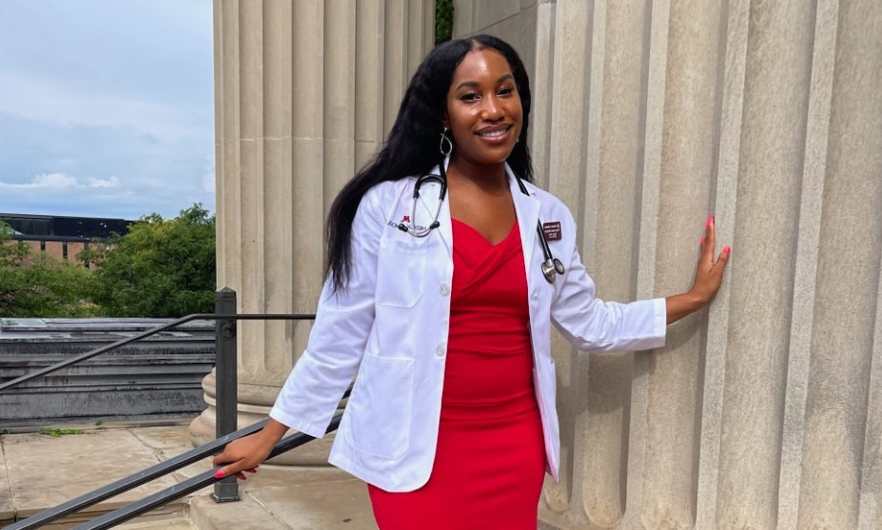Spotlight: Tiffany Onyejiaka, MHS '22
Tiffany plans delve into research projects that marry environmental health and medicine.

Where are you working or studying now?
I am a first-year medical student at The University of Minnesota School of Medicine, where I am attending on a merit scholarship. As a first-year medical student, my studies are focused on classes such as Anatomy, Physiology, Neuroscience, Microbiology, and much much more.
On a daily basis, I attend in-person or remote lectures, I go to lab courses, and then I do lots and lots of studying throughout the day. The library is one of my most visited places! Aside from classwork and studying, I also occasionally engage in volunteer services in senior centers and clinics around the Minneapolis-St. Paul metro area.
Aside from medical school I also work intermittently as a writer. I research and write on a health topic pertaining to a health or medical-related issue, usually health disparities. I also help medical organizations and corporations craft content that helps dispel medical and health misinformation in a reader-friendly format. It changes from time to time, but it’s mainly focused on making science make sense for people who don’t want to read PubMed all day. I will usually do this only when my coursework gives me a bit of breathing room.
How did your degree prepare you for your current and future roles in environmental science?
I believe that my MHS in Environmental Health gave me wonderful preparation for both my medical school career and my writing career.
"Many medical textbooks don't delve too deeply into the environmental impacts of disease and human health, so I feel incredibly lucky to be able to look at my medical studies from this vantage point I got with my EH degree."
- Tiffany Onyejiaka
For medical school, learning about various exposure pathways and molecular implications for disease gave me a nice head start for learning about some of the pathologies of various diseases. I also think that learning about environmental health gave me a unique viewpoint on diseases. I feel that I am able to think about diseases from a biological standpoint, but also from a social, economic, and also environmental viewpoint. I have an understanding that the natural world and social world play a role in disease etiologies and pathologies and that guides my learning processes and also some of my research interests as well. When I learn about cancer, I instantly think about the lectures from my toxicology classes and how those also play a role in shaping the progression of that disease. Many medical textbooks don't delve too deeply into the environmental impacts of disease and human health, so I feel incredibly lucky to be able to look at my medical studies from this vantage point I got with my EH degree.
With my writing, my degree opened my eyes to the various health disparities and crises that are going on all around us. My degree helped spark creativity and shed insight into some very serious and pertinent health issues that I have been able to write about now and will hopefully continue to write about. For example, I published this article directly about how my EH degree inspired my dedication to vote for political candidates that prioritize the health of the Earth and the people who inhabit it. You can read more cool articles about some of the topics I learned in my EH classes here.
What was your favorite thing about going to Johns Hopkins?
My time in the master's program was virtual, but I did enjoy my time as a student. Before I applied I emailed the director, Meghan Latshaw, all my questions about the program and she was super open and willing to speak in depth about everything before I even applied.
I felt that interest from professors trending throughout my time. I enjoyed the openness and willingness of the Johns Hopkins School of Public Health community to embrace and encourage students’ extracurricular passions. During my time at Hopkins, I was deeply immersed in a writing career. So many of my professors were open and willing to be interviewed as experts and professional sources for the various health articles I wrote. It was super fun to get to interview my EH professors. I also felt supported that Johns Hopkins would share the articles I wrote with the greater community, including one I wrote about Kizzmekia Corbett who was the graduation speaker for my year.
Aside from writing, I felt that I could talk with my advisers about my research interests and felt supported. When I had ideas or interests outside of the classroom, I felt very supported in exploring outside opportunities to embrace them.
I believe that at Johns Hopkins Bloomberg, professors see students' capacities beyond the classroom. I believe that I was truly viewed as a scholar and future professional and felt very supported and encouraged to reach my full capabilities. I felt that my deep curiosity was well embraced by my Bloomberg community. I am grateful for my time here which was a very bright light during the worst times of the pandemic.
Environmental Health and Engineering is a cross-divisional department spanning the Bloomberg School of Public Health and the Whiting School of Engineering. This hybrid department is uniquely designed to lead pioneering research and prepare the next generation of scholars to solve critical and complex issues at the interface of public health and engineering.
